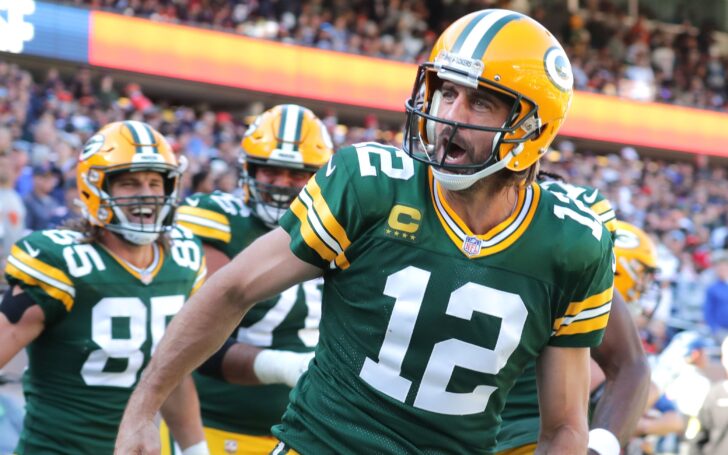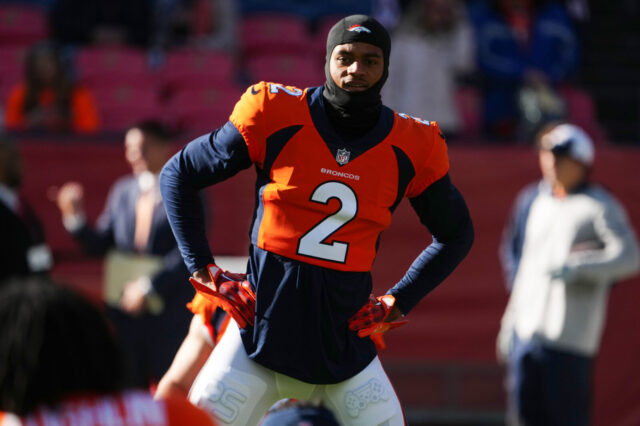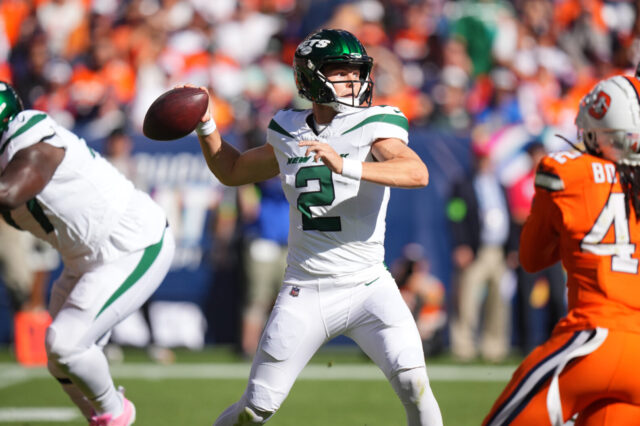We’re now two days into the NFL’s postseason, but the rumors surrounding superstar quarterback Aaron Rodgers have been hot for months.
Rodgers, who’s currently 38 years old and just finished 14th season as the Green Bay Packers’ starter, also isn’t slowing down. He just won his fourth NFL MVP for his electrifying play during the regular season, thanks to his astounding efficiency as a passer.
Now, will he continue to play in Green Bay and finish his career there, or will he jump ship and play for the Denver Broncos (or someone else) this year?
For Broncos fans, this is a no-brainer. Rodgers is at a similar stage in his career as was Peyton Manning, who signed with Denver and played his final four years in the Mile High City. During that stretch, the Broncos went to two Super Bowls and won one as “The Sheriff” rode off into the sunset a winner.
But, how similar are the two quarterbacks in terms of their play, their stage in their respective careers and even in how Rodgers would come to Denver? Let’s take a look.
3 Similarities between Rodgers now and Manning in 2012
1. The first similarity between the two is they have almost exactly identical stats at this point in their careers. Rodgers currently has thrown for 55,360 yards, 449 touchdowns and 93 interceptions and has a career passer rating of 104.5. When Manning came to Denver, he had totaled 54,828 yards, 399 touchdowns and 198 interceptions with a 94.9 passer rating in Indy.
What sticks out there is Rodgers +50 touchdowns and -105 interceptions. Considering Manning changed the game, it’s crazy to say, but Rodgers has been a more efficient passer than Manning was during his time with the Colts.
2. Playoff struggles have been another similarity for the two. Rodgers is currently 11-10 all-time in the playoffs, with one Super Bowl win. Manning was 9-10 in the playoffs in Indianapolis, going 1-1 in the Super Bowl.
For all the hype surrounding where Rodgers will play this upcoming season, the knock on him is losing in the playoffs seemingly every year before getting back to the big game. Shockingly, he and the Packers are 0-4 all-time in the postseason against the San Francisco 49ers, who haven’t been nearly as successful as of late compared to Green Bay.
3. Both Manning and Rodgers have “it.”
“It” is basically undefinable, but you know it when you see it. Simply, both Manning and Rodgers can take good teams and make them great. They find a way to make those around them better. Players like Robert Tonyan and Jordy Nelson come to mind for the Packers, although there are many more. Simply, both Manning and Rodgers demand the most of their teammates and they give those teammates a belief they can win any game, which is dangerous for opponents.
3 Differences between Rodgers now and Manning in 2012
1. Peyton Manning was injured in 2011 and sat out that year, giving him rest. In fact, the neck injury — which required four surgeries — was so scary, it wasn’t a sure thing that Manning would ever play again. However, he came to Denver and played at an All-Pro level, even winning an NFL MVP with the Broncos.
In contrast, Rodgers has been playing his hardest the last two years, elevating his game and pushing his body to the brink. This isn’t to say Rodgers doesn’t still have some gas left in the tank, he certainly does. But, how much? Not only did Manning get that year of rest and recuperation, Rodgers is two years older than Manning was when he signed with Denver a decade ago.
2. Maybe the biggest difference is that Rodgers would have to be traded, while Manning was signed as a free agent. And it’s not like the trade would be small, either.
Many expect the Packers to ask for two first-round picks from the Broncos, multiple other picks as well as a young, growing player. Some have suggested Jerry Jeudy, or Noah Fant, or even Bradley Chubb. But, what if they as for Courtland Sutton as part of the deal?
Beyond the complicated trade, the Broncos would have to pay his insane salary. In 2022, his cap hit is currently $46 million, or 21 percent of the total salary cap this year. Green Bay could agree to eat some of that money, but considering they are in woeful cap position (-$48M), it’s unlikely that would happen.
3. The final difference is more about the situation than the player. In 2012, Manning entered during John Fox’s second season as head coach. Meanwhile, the 2022 Broncos are getting ready to start with a brand new coaching staff, led by first-time head coach Nathaniel Hackett.
If they get Rodgers or not, the Broncos could see some issues in terms of coaching and cohesiveness for the players learning new schemes and new teammates. However, Hackett could be a major reason why Rodgers would want to come to Denver, and a report is saying Hackett is telling Broncos players he’s going after Rodgers right now.
Hackett and Rodgers became close the last three years in Green Bay, with Hackett as the offensive coordinator, and knowing the offense would certainly help the older quarterback adjust to a new team more quickly.
It should also be noted — depending on what happens in free agency — these 2022 Broncos are more loaded with talent than the 2012 team was. So, while Rodgers is older than Manning was at that point, it’s possible the Broncos with Rodgers could truly compete more quickly.
Overall, if the Broncos are able to trade for Rodgers, they are immediate Super Bowl contenders for the next 2-3 years.



